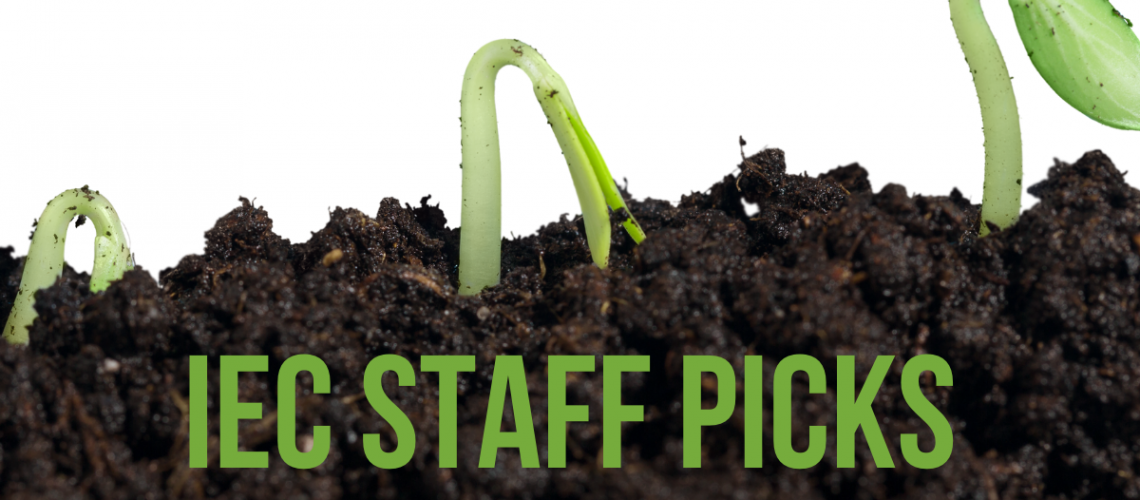Get to know IEC while picking up a few tips and tricks for protecting the environment
Historically, our blog has been a place for IEC staff to share our environmental policy expertise and educational updates on the latest issues facing Illinois. However, we’ve been looking for new ways to connect with other environmentalists like you more regularly, because after all, we are all in this fight together.
In an effort to do that, we’re adding a new regular series to our blog with the goal of sharing with you more about who we are, what moves us to do this work and what we’re excited about most.
For our first “picks”, a few members of our team have shared some of their personal favorite sustainability tips and ways in which our work ties back into our favorites.
When in doubt, throw it out
by IEC Executive Director Jen Walling
This might be a shocker coming from an environmentalist, but it’s more important than ever for would-be recyclers to stop “wishcycling”. Your napkins, dirty pizza boxes and food containers, all things styrofoam, wax-lined coffee cups, plastics without a number on them, and any and all forms of plastic bags* and plastic wrap always go in the trash, or compost if they are a paper product!
I understand the urge to recycle everything possible, but recycling non-recyclable material is a huge problem. China and other countries in Asia have stopped taking contaminated plastic waste from the United States, leaving our contaminated recyclables with nowhere to go.
Maximize this tip:
- Use less! Bring your own container and focus on reusable items. IEC is working at the state and city levels to pass policies that incentivize and remove barriers to reuse. For instance, we passed a law this year that stops city prohibitions on personal containers for bulk food.
- Read up on your local community’s recycling laws! Check out this neat chart from IEPA, or if you are in the city of Chicago, take this quiz and test your recycling knowledge!
*99% percent of Illinois communities do not take plastic bags, but there are a few communities that do take plastic bag curbside. If in doubt, look it up!
van Gogh Green
by IEC Clean Water Advocate Iyana Simba
Painting is one of my favorite hobbies. When I picked it up a few years ago, I quickly realized how much waste I was generating each time I sat down at the easel. So, I challenged myself to find creative ways to reduce my waste and reuse household items. Turns out, with a little forethought, it’s pretty easy to do.
When I paint at home, I use and old bed sheet to protect my floors instead of plastic tarps. Old notebooks make the perfect palettes and an old folding chair is a great stand in for a fancy easel. I was feeling pretty bad about going through so many paper towels, but I now use old t-shirts or washcloths instead with just as much success.
Since joining the IEC staff as a full-time water advocate, I’ve learned much more about plastics pollution in our waterways and the approaches we’re taking to tackle this issue. I recently learned more about the excess paint water I was producing. While most acrylic paints are non-toxic and water-based, they are still not safe to pour down the drain. Acrylic paint is a petroleum-derived polymer–essentially liquid plastic. While I do my best to source environmentally friendly paints and supplies, I’ve found that patience is a simple way to reduce my paint pollution. By waiting for water and paint to separate, I can pour out the less polluted water and discard the remaining paint in the trash.
When it rains, don’t pour
by IEC Development Director Jeff Shelden
Rain events in communities with combined sewer systems can often push wastewater treatment facilities beyond their capacity to treat all wastewater. Even less than an inch of sudden rainfall can result in untreated wastewater being sent into waterways. Gross, right? The ecosystem, including wildlife and humans downstream, are also not thrilled about this.
In my household, we limit our time in the shower and delay using water-intensive appliances like the dishwasher and washing machine during or near rain events to reduce the amount of water that goes into the sewer system.
The Friends of the Chicago River – an IEC Affiliate Member – Overflow Action Days campaign is a great way to learn more about the issue by signing up to receive reminders and tips for reducing the amount of untreated sewage ending up in the river.
Just eat more plants!
by Colleen Smith
Your diet is one of the biggest ways to impact the environment. I have eaten my fair share of Big Macs and Portillo’s, but have been vegetarian for the last 10 years. Here’s why:
- If the entire U.S. skipped eating meat or cheese for just one day a week, it would be the equivalent of not driving 91 billion miles – or taking 7.6 million cars off the road.
- A pound of beef takes about 20,000 lbs of water to produce and 41% of the U.S. contiguous land is used for feeding livestock
- Raising livestock contributes significantly to water pollution and 15% of the world’s greenhouse gas emissions. At IEC, we are working to better regulate confined animal feeding operations, or CAFOs, to reduce some of the major pollution impacts.
p.s. The support of our members drives our success. Please become a member of IEC today so we can continue our important work as the eyes, ears and voice of the environment in Illinois.

